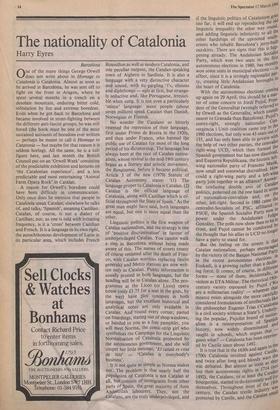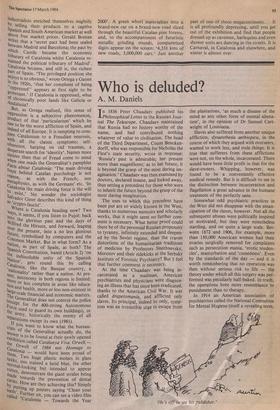The nationality of Catalonia
Harry Eyres
Barcelona
One of the many things George Orwell does not write about in Homage to Catalonia is Catalonia. Almost as soon as he arrived in Barcelona, he was sent off to fight on the front in Aragon, where he spent several months in a trench on a desolate mountain, enduring bitter cold, infestation by lice and extreme boredom. Even when he got back to Barcelona and became involved in street-fighting between the different anti-fascist groups, he was still bored (the book must be one of the most sustained accounts of boredom ever written — perhaps he meant to call it Homage to Catatonia — but maybe for that reason it is seldom boring). All the same, he is a cult figure here, and last month the British Council put on an 'Orwell Week' consisting of the predictable exhibition and lectures on 'the Catalonian experience', and a less predictable and most entertaining 'Animal Farm Opera Rock' in Catalan.
A reason for Orwell's boredom could have been difficuly in communication. Only once does he mention that people in Catalonia speak Catalan; elsewhere he talks of, and talks, 'Spanish', meaning Castilian. Catalan, of course, is not a dialect of .Castilian; nor, as one is told with irritating frequency, is it a 'cross' between Castilian and French. It is a language in its own right, the autochthonous development of Latin in its particular area, which includes French
Roussillon as well as modern Catalonia, and one peculiar outpost, the Catalan-speaking town of Alghero in Sardinia. It is also a language with a very distinctive character and sound, with its gargling Ts, elisions and diphthongs — ugly at first, but strange- ly seductive and, like Portuguese, irresisti- ble when sung. It is not even a particularly `minor' language: more people (about seven million) speak Catalan than Danish, Norwegian or Finnish.
No wonder the Catalans so bitterly resented the repression of their language, first under Primo de Rivera in the 1920s, and then under Franco, who banned the public use of Catalan for most of the long period of his dictatorship. The language has always been at the root of Catalan nation- alism, whose revival in the mid-19th century began as a literary and artistic movement, the Renaixensa, before it became political. Article 3 of the new (1979) Statute of Catalan Autonomy states: '(1) The language proper to Catalonia is Catalan. (2) Catalan is the official language of Catalonia, along with Castilian which is of- ficial throughout the State of Spain.' As the great man might have said, both languages are equal, but one is more equal than the other.
Linguistic politics is the first weapon of Catalan nationalism, and the strategy is one of 'positive discrimination' in favour of underprivileged Catalan. You cannot walk a step in Barcelona without being made aware of this. The names of streets (many of course renamed after the death of Fran- co, with Catalan worthies replacing fascist generals) and Metro stations are now writ- ten only in Catalan. Public information is usually printed in both languages, but the heading will be in Catalan alone. The pro- grammes at the Liceo (or Liceu) opera house (only £1.75 for a seat in the gods, by the way) have plot synopses in both languages, but the excellent historical and analytical notes are only available in Catalan. And round every corner, pasted on hoardings, staring out of shop windows, or handed to you as a free pamphlet, you will meet Norma, the comic-strip girl who symbolises the Campaign for the Linguistic Normalisation of Catalonia promoted by the autonomous government, and she will simper her little message, 'El catald es cosa
de tots' 'Catalan is everybody's business'.
It is not quite as simple as Norma makes out. The problem is that nearly half the population of Catalonia is not Catalan at all, but consists of immigrants from other parts of Spain, the great majority of them Andalusian labourers. They, not the catalans, are the truly underprivileged, and
if the linguistic politics of Catalanism goes too far, it will end up reproducing the old linguistic inequality the other way round, and adding linguistic inferiority to all the other hardships of the uprooted south- erners who inhabit Barcelona's jerry-built outskirts. There are signs that this is hap- pening already. The Andalusian Socialist Party, which won two seats in the first autonomous elections in 1980, has recently won some seats in municipal elections — In effect, since it is a strongly regionalist par- ty, creating little Andalusian boroughs in the heart of Catalonia.
With the autonomous elections coming
up again on 29 April, this should be a mat- ter of some concern to Jordi Pujol, Presi- dent of the Generalitat (wrongly referred to by Orwell as the Generalite, which sounc!s nearer to Granada than Barcelona). pujol s centre-right, strongly nationalist Con- vergencia i Unio coalition came top in the 1980 elections, but only won 43 seats out.hof
135, and has only been able to govern with
the help of two other parties, the centralist right-wing UCD, which then formed the Spanish government but has now dissolved, and Esquerra Republicana, the historic left- wing nationalist party of Francesc Maeta' now small and somewhat discredited. How could a right-wing party and a left-wing party join together in an alliance? Answer. the confusing double axis of Catalan politics, polarised on the one hand in term
s
of nationalism-centralism and, on the other, left-right. Second in 1980 came the centralist-Socialists of PSC, affiliated to PSOE, the Spanish Socialist Party now power under the Andalusian Fein?' Gonzalez. The polls now show then to be in front, and Pujol cannot be comforted by the thought that his allies in UCD no longer have a party to stand for. But the feeling on the streets is that
Catalan nationalism, perhaps encourage' by the victory of the Basque National Party in the recent autonomous elections .10 Euskadi, is a growing rather than a dech": m g force. It comes, of course, in differe
m forms — none of them, incidentally, as violent as ETA Militar. The rhetorical 1,9the century variety espoused by Pujol (wt are a millenarian reality' — whatever th.!. means) exists alongside the more carefully considered formulations of intellectuals like itshea cpihviillossoopiehteyr wEiuthgoeuntioaTsrtaiatse,c.Catalonii, anligsmtheispoapulraerinpeurjporelitsattibornandofoftjsrinpa history, now widely disseminated an taught in schools, which argues that guess what? — Catalonia has been oppress_ ed by Castile since about 1492. . the It is true that in the 1630s and again in _e and st wCatalonia icaet aalfotne after a loraegvoaltnedd bloody vi
against Carasst
was defeated. But almost as soon as they lost their autonomous rights in 1714 (n. 1492), the Catalans, or at least the Catal,a0I; well bourgeoisie, started to do extremely themselves. Throughout most of the 17a`
w s
century, the Catalan textile industry all protected by Castile, and the Catalan srn industrialists enriched themselves mightily by selling their products to a captive Spanish and South American market at well above free market prices. Gerald Brenan writes that a 'secret pact had been sealed between Madrid and Barcelona; the pact by Which Castile became the economic tributary of Catalonia whilst Cataloniare- rnained the political tributary of Madrid'. Catalonia became, and still is, the richest Part of Spain. 'The privileged position she enjoys is so obvious,' wrote Ortega y Gasset in the 1920s, 'that her complaint of being oPpressed" appears at first sight to be grotesque.' If Catalonia is oppressed, what of chronically poor lands like Galicia or Andalusia? But, as Ortega realised, this sense of °Ppression is a subjective phenomenon, Product of that 'particularism' which he saw to be the worst affliction of Spain, and Indeed of all Europe. It is tempting to com- pare Catalanism to a Freudian neurosis, With all the classic symptoms: self- obsession, harping on old traumas, a desperate search for 'identity'. Names more sinister than that of Freud come to mind When one reads the Generalitat's pamphlet Facts about Catalonia: 'The main driving force behind Catalan psychology is not reason, as with the French; nor metaphysics, as with the Germans' etc. 'In Catalonia the main driving force is the will to exist.' No wonder the sociologist Salvador Giner describes this kind of thing as 'crypto-fascist'. Where is Catalonia heading now? Two ways, it seems, if you listen to Pujol: back into the glorious past and the days of Wilfred the Hirsute, and forward, leaping over the present, into a no less glorious future, symbolised by computers and the eninmon Market. But in what form? As a ,nanon, as part of Spain, as both? The Spanish Constitution, based (Article 2) 'on Nine indissoluble unity of the Spanish anon', gets round this by calling Catalonia, like the Basque country, a nationality' rather than a nation. At pre- sent, autonomy in both regions is limited: .1n. °re or less complete in areas like educa- tion and health, more or less non-existent in large-scale financial and economic matters. The Generalitat does not control the police (except for the 400-strong Autonomous Force used to guard its own buildings), or the army, historically the enemy of all seParatisms except its own (1981). If you want to know what the bureau- crats of the Generalitat actually do, the answer is to be found at their newly opened exhibition called Catalunya Viva. Orwell — the Orwell of 1984 not Homage to Catalonia — would have been proud of tnettl. Two huge plastic molars in glass normal-looking one stained a lurid blue, the other
rotten, but intended to appear
_otten, demonstrate the giant strides being made towards the prevention of dental bares. How are they achieving this? Simply toPutting up posters saying 'Clean your , ety ,, Further on, you can see a video film Caned 'Catalonia' — Towards the Year
2000'. A green whorl materialises into a brand-new car on a brand-new road sliced through the beautiful Catalan pine forests, and, to the accompaniment of futuristic metallic grinding sounds, computerised digits appear on the screen: '4,331 kms of new roads, 3,000,000 cars.' Just another
part of one of those megacontinents... It is all profoundly depressing, until you get out of the exhibition and find that people dressed up as cavemen, harlequins and even shower units are dancing in the streets. It is Carnaval, in Catalonia and elsewhere, .and winter is almost over.















































 Previous page
Previous page